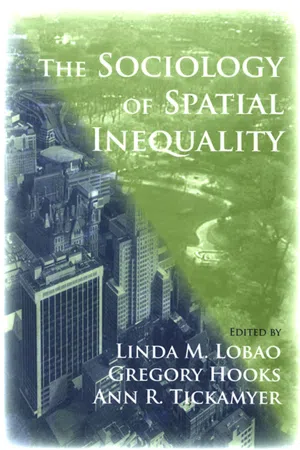
eBook - PDF
The Sociology of Spatial Inequality
- 286 pages
- English
- PDF
- Available on iOS & Android
eBook - PDF
The Sociology of Spatial Inequality
About this book
A sociological look at the role of space in inequality.
2007 CHOICE Outstanding Academic Title
Sociologists have too often discounted the role of space in inequality. This book showcases a recent generation of inquiry that attends to poverty, prosperity, and power across a range of territories and their populations within the United States, addressing spatial inequality as a thematically distinct body of work that spans sociological research traditions. The contributors' various perspectives offer an agenda for future action to bridge sociology's diverse and often narrowly focused spatial and inequality traditions.
Frequently asked questions
Yes, you can cancel anytime from the Subscription tab in your account settings on the Perlego website. Your subscription will stay active until the end of your current billing period. Learn how to cancel your subscription.
No, books cannot be downloaded as external files, such as PDFs, for use outside of Perlego. However, you can download books within the Perlego app for offline reading on mobile or tablet. Learn more here.
Perlego offers two plans: Essential and Complete
- Essential is ideal for learners and professionals who enjoy exploring a wide range of subjects. Access the Essential Library with 800,000+ trusted titles and best-sellers across business, personal growth, and the humanities. Includes unlimited reading time and Standard Read Aloud voice.
- Complete: Perfect for advanced learners and researchers needing full, unrestricted access. Unlock 1.4M+ books across hundreds of subjects, including academic and specialized titles. The Complete Plan also includes advanced features like Premium Read Aloud and Research Assistant.
We are an online textbook subscription service, where you can get access to an entire online library for less than the price of a single book per month. With over 1 million books across 1000+ topics, we’ve got you covered! Learn more here.
Look out for the read-aloud symbol on your next book to see if you can listen to it. The read-aloud tool reads text aloud for you, highlighting the text as it is being read. You can pause it, speed it up and slow it down. Learn more here.
Yes! You can use the Perlego app on both iOS or Android devices to read anytime, anywhere — even offline. Perfect for commutes or when you’re on the go.
Please note we cannot support devices running on iOS 13 and Android 7 or earlier. Learn more about using the app.
Please note we cannot support devices running on iOS 13 and Android 7 or earlier. Learn more about using the app.
Yes, you can access The Sociology of Spatial Inequality by Linda M. Lobao, Gregory Hooks, Ann R. Tickamyer, Linda M. Lobao,Gregory Hooks,Ann R. Tickamyer in PDF and/or ePUB format, as well as other popular books in Social Sciences & Rural Sociology. We have over one million books available in our catalogue for you to explore.
Information
Table of contents
- THE SOCIOLOGY OF SPATIAL INEQUALITY
- Contents
- Acknowledgments
- 1. Introduction: Advancing the Sociology of Spatial Inequality
- 2. Advancing the Sociology of Spatial Inequality: Spaces, Places, and the Subnational Scale
- 3. New and Unexplored Opportunities: Developing a Spatial Perspective for Political Sociology
- 4. Territories of Inequality: An Essay on the Measurement and Analysis of Inequality in Grounded Place Settings
- 5. The Spatial Politics of Public Policy: Devolution, Development, and Welfare Reform
- 6. Differential Mortality Across the United States: The Influence of Place-Based Inequality
- 7. Placing Family Poverty in Area Contexts: The Use of Multilevel Models in Spatial Research
- 8. Adios Aztlan: Mexican American Out-Migration from the Southwest
- 9. A Spatial Analysis of the Urban Landscape: What Accounts for Differences across Neighborhoods?
- 10. Space for Social Inequality Researchers: A View from Geography
- 11. Conclusion: An Agenda for Moving a Spatial Sociology Forward
- About the Editors and Contributors
- Index